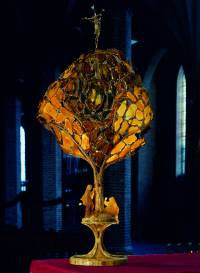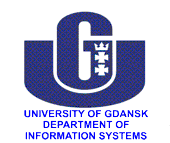
|
|
|
THE FOURTH AIS SIGSAND WEBSITE
The Second AIS SIGSAND
European Symposium on Systems Analysis and Design
University of Gdańsk, Poland
June 5th 2007
SIGSAND and SIGSAND - Europe Initiative
I am very pleased to say that the Second SIGSAND-Europe Symposium will be held in Gdańsk, Poland on June 5, 2007. The organizers are Professors Stanisław Wrycza, Jacek Maślankowski, and Jarosław Olejniczak.
Please allow me to briefly introduce SIGSAND and SIGSAND-Europe Initiative. The Special Interest Group on Systems Analysis and Design (SIGSAND) is affiliated with the Association for Information Systems (AIS). The idea of having a special interest group for Systems Analysis and Design researchers was discussed in Interlaken, Switzerland during the EMMSAD’01 (Evaluation of Modeling Methods in Systems Analysis and Design) workshop. A proposal to set up the special interest group was submitted in the Summer of 2003 and the proposal was approved at the International Conference on Information Systems (ICIS) 2003 meeting on December 14.
SIGSAND aims to provide researchers in the Systems Analysis and Design area with services such as news, announcements of conferences and call for papers, portals for working papers, research, and teaching, sponsorships of tracks at major conferences, symposiums, listserv, and special issues in journals. The objectives are to provide a forum for researchers in the Systems Analysis and Design area to interact and collaborate, and to develop the Systems Analysis and Design research area.
SIGSAND has sponsored a number of symposiums and workshops since its inception. SIGSAND members have organized symposiums in Miami in 2002 and 2003, St. John's, Canada in 2004, Cincinnati in 2005, and Vancouver, Canada in 2006. In addition, SIGSAND has sponsored the EMMSAD workshops in Porto, Portugal in 2005, and in Luxembourg in 2006. Further, SIGSAND has been organizing tracks for the Americas Conference on Information Systems since 2005. These activities of SIGSAND help to promote research in the area of Systems Analysis and Design, and to unite and develop comradeship among the researchers.
The SIGSAND-Europe Initiative was initiated in 2005 to promote the internationalization of SIGSAND and to recruit researchers in Europe who are working in the Systems Analysis and Design area to join SIGSAND. The SIGSAND-Europe Initiative is currently headed by me and a SIGSAND-Europe Advisory Board consisting of prominent researchers to guide the effort has been formed. The first SIGSAND-Europe Symposium was held in Galway, Ireland on June 6, 2006 and it was a huge success. The organizers of the first SIGSAND-Europe Symposium are Michael Lang, Briony Oates, and Keng Siau. The second SIGSAND-Europe Symposium will be held in Gdańsk, Poland on June 5, 2007 and I am sure it will be another very successful SIGSAND event.
As the Coordinator of the SIGSAND-Europe Initiative and the Chair of the SIGSAND-Europe Advisory Board, I would like to thank everyone for making the SIGSAND-Europe Initiative a success story. In particular, I would like to thank the members of the SIGSAND-Europe Advisory Board and the SIGSAND-Europe Working Committee for helping me in making this initiative a huge success. Also, without the strong support of the SIGSAND officers, Dinesh Batra, Ramesh Venkataraman, Akhilesh Bajaj, and Te-Wei Wang, the SIGSAND-Europe Initiative would not be possible. Last but not least, I sincerely appreciate the effort of Michael Lang and Briony Oates for helping me to organize the first SIGSAND-Europe Symposium and Stanisław Wrycza for taking the lead in organizing the second SIGSAND-Europe Symposium.
Let us continue to work together to make SIGSAND one of the most successful special interest groups in AIS. Thank you.
Sincerely,
Professor Dr. Keng Siau
Coordinator, SIGSAND-Europe Initiative
Chair, SIGSAND-Europe Advisory Board
June, 2006
Effective systems analysis and design is a key factor in the successful application of computer-based systems. However, the research of the systems analysis and design seems to have received less attention in recent years than it did in the past. This does not mean that we know everything we need to know about systems analysis and design. On the contrary, new applications of computer-based systems are being developed, which need appropriate methods of analysis and design (e.g. Web-based systems and ubiquitous computing), new systems development methods have emerged, which need empirical study and evaluation (e.g. agile methods), and an opportunity now arises to reflect upon whether the lessons learnt earlier about systems analysis and design have been applied or have been forgotten.
The objective The Second EuroSIGSAND Symposium is to provide a forum for researchers, educators and practitioners interested in systems analysis and design to meet and exchange ideas and results. It also provides researchers an opportunity to present their research papers and experience reports, and to take part in open discussions and panel.
The symposium is supported by the AIS Special Interest Group on Systems Analysis & Design (SIGSAND), and PLAIS.
<< Back to topRelevant topics include , but are not limited to, the following:
- System Theory and Principles
- Ontological Foundations of Systems Analysis and Design
- Philosophical Issues in Systems Analysis and Design
- Object Oriented Techniques and Methodologies
- Unified Modeling Language (UML)
- Transition from Structured Approaches to Object Oriented Approaches
- System Life Cycle
- Requirements Engineering
- Business Process Modeling and ERP Systems
- Conceptual Modelling
- Database Analysis and Design
- Information Systems Development Methods and Techniques e.g. RUP, MDA, SOA, Agile Methods/ XP, Web Design methods, etc.
- Use of Computer-Aided Systems Engineering (CASE)
- Evaluations of Systems Analysis and Design Modelling Methods and Techniques
- Component-based Systems Development
- Commercial off-the-shelf (COTS) Applications
- Rapid Systems Development
- Human-Computer Interaction and Prototyping
- Software Engineering
- Software Quality Management
- Open Source Software (OSS) Solutions
- Ethical, Human and Organizational aspects of IS Development
- Economics of Information Systems
- Teaching Systems Analysis and Design
- Curriculum Design and Implementation issues
- E-learning in Systems Analysis and Design
- Case Studies and Experience Reports from Professional Placement Programmes
- Empirical Studies of Systems Analysis and Design Methods and Techniques
- Workflow Management
- Project Management Issues in Systems Analysis and Design
<< Back to top
Deadline for papers |
February 18, 2007 |
|
|---|---|---|
Notification of acceptance |
April 2, 2007 |
|
Camera-ready copies |
April 30, 2007 |
|
AIS SIGSAND Symposium |
June 5, 2007 |
|
Welcome by Prof. Stanislaw Wrycza
Dear Coleagues,
Dear Friends,
On behalf of Department of Business Informatics of University of Gdansk and Polish Chapter of Association for Information Systems, I am very glad to have an opportunity to open The Second AIS SIGSAND European Symposium on Systems Analysis and Design at University of Gdańsk. Effective systems analysis and design is the key factor of the successful application of computer-based systems. Both researchers and practitioners know it very well and therefore they meet at the conferences and symposia like this one to exchange and discuss the knowledge and ideas, asses new concepts, stimulate original proposals.
Usually the Symposium is perceived as the cameral event - however The Second EuroSIGSAND Symposium attracted attention of many authors. 32 papers were submitted. 18 of them were accepted in the process of the careful evaluation with the high quality criteria. They will be presented in 6 parallel sessions. However we will commence with keynote speech to be given by Professor Keng Siau from University of Nebrasca-Lincoln, United States while we end with panel prepared by our German colleagues from University of Marburg/Lahn
Dear Colleagues,
I would like to welcome the guests of our Symposium - Deputy President of University of Gdansk Professor Bernard Lammek and Dean of Faculty of Management Professor Miroslaw Szreder. Our Rector would like to greet The Euro SIGSAND Symposium participants
Dear Colleagues,
I was asked by Professor Keng Siau to give a presentation of Department of Business Informatics. I would like to limit this presentation to several main, mostly international activities. There are 20 professors and assistants employed in our Department. We were the organizer of Xth European Conference on Information Systems ECIS2002, the coordinator and partner of several European research and educational projects. The Polish Society for Business Informatics (NTIE . Naukowe Towarzystwo Informatyki Ekonomicznej) and Polish Chapter of AIS, I am the President now, were established here in our Department respectively in 1995 and 2005. The Internet service of another our professional organization . ISAHI . Information Systems Academic Heads International is on our server. In 1988 the Department started the International Conference on Information Systems Development. Till now 15 editions of ISD Conference widely accepted and well know by professionals worldwide, were accomplished in the MIS centres at several continents and Proceedings were published first by Kluver Academic and then by Springer Science. We conduct two series of publications: Business Informatics Research Reports in English and the series of academic manuals - Informatyka Ekonomiczna in Polish. The research and publications of the Department concentrate around information systems development and recently regard Unified Modeling Language UML. The academic manual on UML 2 since one and half year is at the top of rankings of IT books in Poland.
50 scholars and practitioners from 12 countries are participating in the Symposium. I would like to welcome very warmly our guests from abroad. Willie Yip had the longest trip to join us, as he travelled from Hong Kong. Prof. Keng Siau and his wife Fiona Nah arrived from United States. We have the guest from Ireland .Prof. Markus Helfert, the promotor of European Business Informatics studies. Thank you for coming to Alexandre Bern from Finland, Ozlem Albaryak from Turkey, Andrea Sabau from Romania, Habib Abdulrab from France, Professors Wolfgang Hasse and Dirk Mueller from Germany, Thomas Osterlie from Norway, Salvador Bueno from Spain, V. Shankar from India. I sincerely welcome the guests from many Polish universities in particular from Department of Business Informatics of Warsaw Economic University as we always have had a good cooperation with this team. Welcome the representatives of IT firms. And last but not least I welcome the staff of the organizer of this Symposium - the employees of the Department of Business Informatics of University of Gdansk. I wish all of you the fruitful and stimulating Symposium.
Dear Colleagues,
Now I would like to ask Professor Keng Siau for giving the keynote speech, entitled: Systems Analysis and Design. Trends and Directions.
He is the E. J. Faulkner Professor of Management Information Systems (MIS) and Director of the UNL-IBM Global Innovation Hub. He is also serving as the Editor-In-Chief of the Journal of Database Management and Co-Editor-in-Chief of the Advances in Database Research book series.
Ladies and Gentemen,
The worldwide famous Professor of Management Information Systems, the authority in our field. Keng Siau.
8.30 - 9.00 |
Registration |
|
|---|---|---|
9.00 - 9.05 |
Welcome |
|
9.05 - 10.30 |
Keynote speech |
|
10.30 - 11.00 |
Coffee break |
|
11.00 - 12.30 |
Parallel sessions: A, B and C |
|
12.30 - 13.30 |
Lunch |
|
13.30 - 15.00 |
Parallel sessions: D, E and F |
|
15.00 - 15.30 |
Coffee break |
|
15.30 - 17.00 |
Panel |
|
19.30 - 22.00 |
Symposium Dinner, "Zlota rybka" ("Golden Fish"), Sopot, Bohaterów Monte Cassino 36/2 |
|
Keynote Speech (room C4)
- Systems Analysis and Design. Trends and Directions.
Keng Siau (University of Nebraska-Lincoln,USA)
Chairman: Stanislaw Wrycza (University of Gdansk, Poland)
A - Open Source Software & Globally Distributed Software Development (room C4)
Chairman: Michael Lang (National University of Ireland, Galway)
- Open Source Software Diffusion and Adoption: A Delphi Forescasting Study
Maria Dolores Gallego, Paula Luna and Salvador Bueno (University of Seville, Spain)
- A Critical Review of Software Engineering Research on Open Source Software Development
Thomas Osterlie, Letizia Jaccheri (Norwegian University of Science and Technology, Norway)
- Understanding Cultural Differences in Development of Virtual Communities
Keng Siau, Fiona Fui-Hoon Nah and Min Ling (University of Nebraska-Lincoln,USA)
B - Conceptual Modelling (room C2)
Chairman: Willie Yip (The Hong Kong Polytechnic University, China)
- 3SST Model: A Three Step Spatio-Temporal Conceptual Model
Andreea Sabau (Babes-Bolyai University, Cluj-Napoca, Romania)
- Ontology-based requirements representation in the process of building information systems
Andrzej Sobczak (Warsaw School of Economics, Poland)
- Implementation of Service-Oriented Architecture for Business Goals Realization
Nowicki Adam and Nosal Mariusz (Wroclaw University of Economics,Poland)
C - Object-Oriented Analysis & Design (room C7)
Chairman: Markus Helfert (Dublin City University, Ireland)
- Towards a Light Version of UML 2.x: Appraisal and Model
Stanislaw Wrycza and Bartosz Marcinkowski (University of Gdansk, Poland)
- UML 2.0 in the modelling of the complex business processes of reporting and control of financial information system
Sebastian Kwapisz (University of Gdansk, Poland)
- Application of Generative Programming to Evolution of Object-Relational Mapping Layer
Andrzej Grudzien, Tomasz Traczyk (Warsaw University of Technology, Poland) and Stanislaw Jarzabek (National University of Singapore)
D - Contextual Issues in Information Systems Development & Implementation (room C4)
Chairman: Fiona Fui-Hoon Nah (University of Nebraska-Lincoln, USA)
- Contextual Factors Affecting the Software Development Process. An Initial View
Alexandre Bern, Aparna Satya Jaya Pasi, Uolevi Nikula, and Kari Smolander (Lappeenranta University of Technology, Lappeenranta, Finland)
- Web-based Systems Development: An Empirically-Grounded Conceptual Framework
Michael Lang (National University of Ireland, Galway)
- An explorative study on introducing Business Processes Management in Healthcare
Markus Helfert (Dublin City University, Ireland)
E - Systems Analysis & Design Education (room C2)
Chairman: Thomas Osterlie (Norwegian University of Science and Technology, Norway)
- Achieving Outcome-based Learning through Systems Analysis and Design
Willie Yip and Kai-Pan Mark (The Hong Kong Polytechnic University,China)
- Experiences of Teaching "Systems Analysis and Design" to Undergraduate Software Engineers
Ozlem Albayrak (Izmir University of Economics, Turkey)
- Teaching Systems Analysis and Design in Polish Economic Universities: Structural or Object-oriented?
Przemyslaw Polak (Warsaw School of Economics, Poland)
F - Information Systems Engineering (room C7)
Chairman: Salvador Bueno (University of Seville, Spain)
- On the load balancing of Business Intelligence Reporting Systems
Leszek Kotulski (AGH University of Science and Technology,Poland) and Dariusz Dymek (Cracow University of Economics, Poland)
- Towards a robust software framework for DCSP solving in multi-agent systems
Sami AL-MAQTARI, Habib Abdulrab and Eduard Babkin (LITIS Laboratory,INSA,Rouen, France)
- HVRmonitor - data replication monitoring method
Marek Krzysztof Kaminski (Gdansk University of Technology, Poland)
Panel (Room - C4)
- The concept of information and its impact on information systems and information society
Wolfgang Hesse, Dirk Müller (University of Marburg/Lahn), Keng Siau (University of Nebraska-Lincoln, USA)
Professor Keng Siau,
University of Nebraska-Lincoln, USA
Systems Analysis and Design Research -- Trends and Directions.
Authors of accepted papers must format their papers in accordance with the proceedings template, and return revised camera-ready versions to Stanislaw Wrycza (swrycza@univ.gda.pl) no later than April 30, 2007
To download the proceedings template in Microsoft Word format, please click here
<< Back to top"Everyone walking the streets of Gdańsk for the first time is surprised by the extreme beauty with which the city has been laid out and the rare splendour and luxurious sumptuousness that are manifest everywhere. What in Gdańsk enchants most are not the churches, although among these one can find much that is worth attention, but the very foundations of the city and the way in which its power and the riches of its burghers have been embodied in its architecture".
Views such as these may be found not only in any poem in praise of the beauty of Gdańsk but also in scientific monographs on the history of European architecture. When serious scientists use the language of poetry there can be but one reason: a real admiration of the city's beauty. Gdańsk has always evoked admiration and love. We find them in expert treaties, travellers’ tales and the reminiscences of former inhabitants forced to leave the city to live afar. Similar reactions are also to be seen today. Anyone who has, if only once, shown Gdańsk to newcomers has been able to experience it. The visitors absorb its immortal beauty without analysing it or wondering what is authentic and what was reconstructed after the terrible destruction of the last war. They commune directly with the history and draw joy and satisfaction from it. This is the best proof of the rightness of the concept of reconstruction as accepted half a century ago.
A great attraction of Gdańsk lies in its old traditions. It is pervaded by its long and often dramatic history, from the visit of St. Adalbert in 997 to the great celebration of its millennium. Its history is present in its old documents and architectural landmarks, in its science and culture and in the everyday life of its people.
The traditional love of freedom has remained ever alive, revealed equally strongly in the 15th century, when the burghers of Gdańsk shook off the yoke of the Teutonic Knights, and in the times of "Solidarność", when they successfully revolted against the Communist system. Its spiritual power was manifest in the achievements of the pioneers of science from Gdańsk, including such distinguished men as the astronomer Jan Hevelius, the physicists Gabriel Fahrenheit and Daniel Gralath and the philosopher Arthur Schopenhauer. Had they lived in the 20th century, these would have been Nobel prize-winners like their successors, the biochemist Adolf Butenandt, the fighter for freedom Lech Wałęsa and the man of letters Günter Grass.
Gdańsk has always had its outstanding artistic creators of brick, stone and amber masterpieces. The city was and is the world's amber capital. The most famous achievement of the masters from Gdańsk was the Amber Chamber, unfortunately lost in the last war.
The scientific and artistic traditions of Gdańsk have been maintained and developed by its nine institutions of higher education with their 700 professors and 55,000 students.
What is the secret of this magic of Gdańsk? The city is unique. It is not only its art and architecture that are beautiful but also its surroundings. It is situated at the junction of three geographical regions: the Kashubian Uplands, which reach 300 m in height, the Lowlands of Żuławy, the Polish “Holland” with depressions of more than 1m below sea level, and the sandy beaches of the sea shore, known as the Amber Coast, since amber really can be gathered along it. Gdańsk combines the triple beauty of landscape, architecture and history, as well as being a busy seaport and a centre of science, education, industry and culture. Best of all, however, are its people - freedom loving, open to new ideas and friendly to visitors from all over the world. They have a proverb, old but ever valid: "Everyone loves two cities - the one where he was born and Gdańsk". You may prove this for yourselves.
Prof. Andrzej Januszajtis
 |
 |
 |
The symposium accepts various types of submissions:
- Completed Research (full papers)
- Research-in-progress (short papers)
- Experience Reports
Completed research papers schould include analysis of data and discussion research findings. Research-in-progress papers report on research that is well under way with preliminary results available at the time of the symposium.
Please use the following format for your submissions:
- For Completed Research submissions, the paper should not exceed 6,000 words (excluding references and appendices).
- For Research-in-progress, and Experience Report submissions, the paper should not exceed 3,000 words (excluding references and appendices).
- Include a cover page with the title of paper as well as authors' names, affiliations, and contact details. The total number of words in the paper (excluding cover page, tables, and references) and submission category (i.e. Completed Research, Research-in-Progress or Practitioner Experience Report) should be indicated on the cover page.
The second page should begin with the title of the paper and an abstract of no more than 150 words. Include keywords, chosen from the list of main topics above (if applicable). The main text should follow the keywords.
- Use 12-point Arial, line-and-a-half spacing for the main body text.
Only electronic submissions will be accepted. Submit your paper by Symposium Submission Service.
<< Back to topStanisław Wrycza, University of Gdańsk, Poland
Michael Lang, National University of Ireland, Galway,
Ireland
Keng Siau, University of Nebraska - Lincoln, USA
David Avison, ESSEC Business School, France
Richard Baskerville, Georgia State University, USA
Phillip Ein-Dor, Tel-Aviv University, Israel
Guy Fitzgerald, Brunel University, UK
Juhani Iivari, University of Oulu, Finland
Sirkka Jarvenpaa, University of Texas, Austin, USA
Pericles Loucopoulos, The University of Manchester, UK
Kalle Lyytinen, Case Western Reserve University, USA
John Mylopoulos, University of Toronto, Canada
Matti Rossi, Helsinki School of Economics, Finland
Maung Kyaw Sein, Agder University College, Norway
Peretz Shoval, Ben-Gurion University of Negev, Israel
Keng Siau, University of Nebraska-Lincoln, USA
Bajaj Akhilesh, The University of Tulsa, USA
Pavle Bataveljic, University of Brighton, United Kingdom
Dinesh Batra, Florida International University, USA
Paul Beynon-Davies, Cardiff University, United Kingdom
Sjaak Brinkkemper, Utrecht University, The Netherlands
Sven Carlsson, Lund University, Sweden
Patrick Y.K. Chau, The University of Hong Kong
Roger Chiang, University of Cinncinati, USA
Georgios I. Doukidis, Athens University of Economics and Business, Greece
Malte Dreyer, Max Planck Society, Germany
Jan Goliński, Warsaw School of Economics, Poland
Janusz Górski, Gdańsk University of Technology, Poland
Janis Grundspenkis, Riga Technical University, Latvia
Horst Guenther, University of Rostock, Germany
Vadim S. Gurov, eVelopers Corp., St.-Petersburg, Russia
Igor Hawryszkiewycz, University Technology, Sydney, Australia
Markus Helfert, Dublin City University, Ireland
Letizia Jaccheri, Norwegian University of Science and Technology, Norway
Dimitris Karagiannis, University of Vienna, Austria
Karlheinz Kautz, Copenhagen Business School, Denmark
Jerzy Kisielnicki, Warsaw University, Poland
Marjan Krisper, University of Ljubljana, Slovenia
Hee Beng Kuan Tan, Nanyang Technological University, Singapore
Bernard Kubiak, University of Gdansk, Poland
Karl Kurbel, European University Viadrina, Germany
Paula Luna, University of Seville, Spain
Adam Nowicki, University of Economics, Wrocław, Poland
Briony J. Oates, University of Teesside, United Kingdom
Józef Oleński, Warsaw University, Poland
Jinsoo Park, Seoul National University, Korea
Nava Pliskin, Ben-Gurion University of the Negev, Israel
Narcyz Roztocki, State University of New York, USA
Paulo Rupino da Cunha, University of Coimbra, Portugal
Anatholy Shalyto, St.-Petersburg Technical University of Information Technologies, Russia
Maddalena Sorrentino, University of Milan, Italy
Reima Suomi, University of Turku, Finland
Zdzisław Szyjewski, University of Szczecin, Poland
Cathy Urquhart, University of Auckland, New Zealand
Jan Vanthienen, Catholic University of Leuven, Belgium
Olegas Vasilecas, Vilnius Technical University, Lithuania
Ramesh Venkataraman, Indiana University, Bloomington, USA
Jiri Vorisek, University of Economics, Prague, Czech Republic
Birger Weynants, Catholic University of Leuven, Belgium
Carson Woo, University of British Columbia, Vancouver, Canada
Joze Zupancic, University of Maribor, Slovenia
<< Back to top
Stanisław Wrycza, University of Gdańsk, Poland
Jacek Maślankowski, University of Gdańsk, Poland
Jarosław Olejniczak, Warsaw School of Economics, Poland
<< Back to top- PLAIS
- Department of Information Systems
University of Gdańsk81-824 Sopot
Armii Krajowej 119/121
Poland
ph. +48 58 550 94 00
fax +48 58 551 59 31
mail: kie@univ.gda.pl
<< Back to top
The Symposium fee is 50 euros and includes:
- entrance to all Symposium sessions
- proceedings - printed and on CD-ROM
- lunch and refreshments at morning and afternoon breaks
- Symposium Dinner
- Cyber Cafe facilities
Please transfer the registration fee at the Symposium account:
University of Gdansk
35124012711111000014925388
Bank PEKAO S.A. IV O/Gdansk
ul. Kolobrzeska 43
subaccount number: 2313
IBAN: PL35124012711111000014925388
SWIFT: PKOPPLPW
The accepted papers for AIS SIGSAND European Symposium in Gdansk will be published as the pre-Conference Proceedings, issued by University of Gdansk Press. They will be also considered for publication in a volume of the Advances in Database Research series after the Symposium. The series is published by the Idea Group Publishing.

